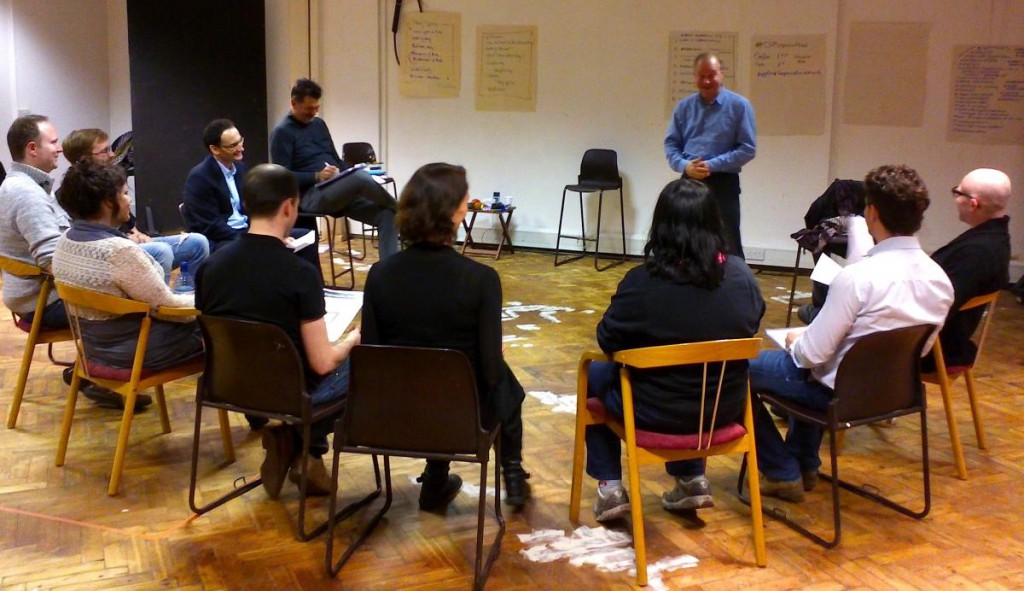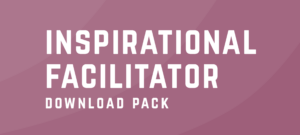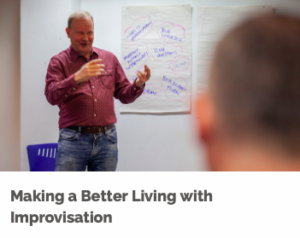Why safety matters
Life tends to be easier when you know what to expect. You feel more comfortable when you are in familiar territory. When a detailed, plausible plan is in place, you think you know what will happen next.
When we improvise, we are by definition entering into an unknown; it’s going to be something of an experiment. A major reason for learning improvisation is to become more comfortable with the uncomfortable. But the learning experience should be no more uncomfortable than necessary.
For example, an improvisation workshop does no favours by appearing unplanned or experimental. On the contrary, it might be better for it to feel very safe – as a holding structure – so that within it you can play with the improvisational elements of the unknown and the unfamiliar.

When people encounter improvisation, they are often naturally nervous. An improvisation class is exciting to some, daunting to others. Any workshop, course or programme is also a learning environment, which means people experiencing novelty and change. This can be nerve-wracking, irrespective of any improvisational content.
Such circumstances dictate the value of a well-designed structure that takes care of people, so that they can learn effectively, which people usually do best in a state of relaxed attention, not states of fear and confusion.
For this double reason, safety is really important when you attend any improvisation workshop. This means psychological safety, as well as physical. If there is anything you are asked to do that you are not comfortable to do – for any reason whatever – remember that it’s your legitimate choice to say, “No, I’m not going to do that one.”
An improvisation class need be no more (or less) stressful or safe than a class in painting, metalwork or gardening.
At some point in a climbing class, you’ll be expected to climb; in a fire safety session, to put out a fire; and to walk a tight-rope in a course of circus skills. In none of these would you relish being put in any unreasonable danger or subjected to stress.
Stress tends to reduce our level of performance. To get good at any skill it helps to be focused and relaxed. This is as true for developing our improvisation capacity as any other.
In improvisation activities, you are likely to reveal your spontaneous self, perhaps showing aspects that surprise yourself or those around you. It’s helpful to be able to participate in such activities feeling calm and confident, not bewildered by wondering what the session (or activity) is all about. It also helps to do it without feeling that you are being judged – whether that means being psychologically assessed for something you might say or do, or on the strength of how good your performance is (unless it’s a performance class).
In the workshops at my Improvisation Academy, it’s fine to reveal as much or as little as you wish to, as you go along – and there is absolutely no pressure to perform. That’s worth mentioning, because much of the manifestation of improvisation currently is on stage – as a form of performance and entertainment. You need to learn performance and improvisation skills if you want become an improvisation performer – or even a stand-up comedian.
But equally, if you haven’t the slightest intention whatsoever of going onto a stage, that’s absolutely fine too, because improvisation skills can be applied to many other areas of life and in almost any work context – and it is those applications that are of growing interest in many leading organisations.
[insert_php]
if ( comments_open() || get_comments_number() )
comments_template( ”, true );[/insert_php]
Get free tips on how to develop confidence and creativity straight into your inbox.
Paul Jackson Associates Limited. A registered company in England and Wales.
Company Number 09564618. VAT Number GB 213 37981.
Registered Address 10 Greville House, Lower Road, Harrow on the Hill, Middlesex, HA2 0HB.
Postal Address 34a Clarence Road, St Albans, Hertfordshire, AL1 4NG
Telephone 01727 843 820
Mobile 07973 953 586
© 2009-2016 Paul Jackson Associates / The Improvisation Academy – All Rights Reserved



![DJI Systems - web design | marketing | admin systems | consulting - [ anglesey / wales ] DJI Systems - web design | marketing | admin systems | consulting - [ anglesey / wales ]](https://djisystems.com/banners/DJI_WebBanner_lt.png)
